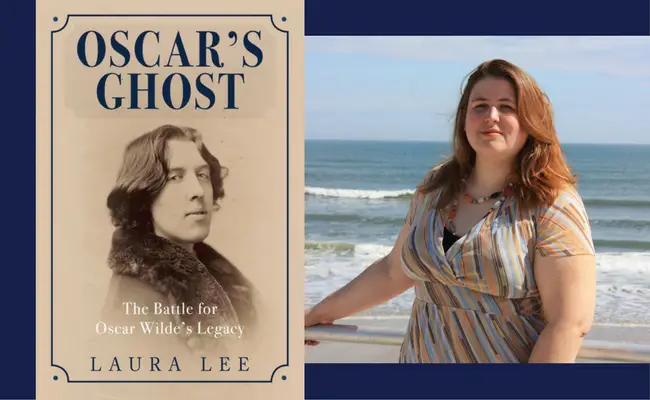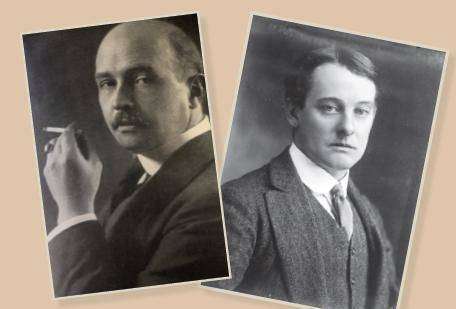OSCAR’S GHOST – Laura Lee on the battle for Oscar Wilde’s legacy
As a huge fan of Oscar Wilde’s shorter works (The Importance of Being Earnest, Lady Windermere’s Fan, An Ideal Husband andThe Canterville Ghost) it is with great pleasure that I welcome the author of Oscar’s Ghost, Laura Lee to Booklover Book Reviews.
Laura shares with us the fascinating story of how she came to write this book, the first to focus on the battle for Oscar Wilde‘s legacy.

Exorcising Oscar’s Ghost
When I got my first Kindle I had no idea that it would lead me into a research project that spanned several years, included travel to distant archives, squinting at early 20th Century letters and police files, and the purchase of three shelves worth of books.
People often come to writers and say, “You should write about this” or “You should write about that.” But the big problem with writing is not coming up with something to write about, it is finding the time, energy and motivation to finish. Good ideas are as common as air. Ideas that become finished books are rare. Writing an entire book, whether non-fiction or fiction, is a huge commitment. It requires an energy bordering on obsession and there are always times in the process when it seems impossible or at least not worth the effort. To overcome those hurdles and get the momentum to complete a literary project requires one key ingredient: curiosity. This leads me back to my Kindle.
My Kindle was a Christmas gift, and as a starving artist, I could not afford to fill it with the latest titles. Instead, I looked for something free in the public domain and I decided to make my first Kindle download Oscar Wilde’s De Profundis. I was excited by the long essay and lines like,
“…if you want an inscription to read at dawn and at night-time, and for pleasure or for pain, write up on the walls of your house in letters for the sun to gild and the moon to silver, ‘Whatever happens to oneself happens to another.’ Christ’s place indeed is with the poets. His whole conception of Humanity sprang right out of the imagination and can only be realised by it.”
A short time later, I learned that the copy I had downloaded was an abridged version. It was either the 1905 or 1908 edition edited by Robert Ross. Much of De Profundis was not made available until 1962 in order to protect living people, notably Wilde’s lover Lord Alfred Douglas. When I learned this, I had to read the full version. As it happened, I had a copy of Wilde’s Complete Works on my shelf, so I took it down and started reading. I was, initially, sorry I had. The parts of De Profundis that were not originally published are a personal letter to Douglas, full of recriminations. Some of it seemed cruel:
“Do you really think that at any period in our friendship you were worthy of the love I showed you, or that for a moment I thought you were? I knew you were not.”
A fair-minded person reading the personal parts of De Profundis naturally wonders what the other guy has to say about it all. Lord Alfred Douglas, it turns out, had a lot to say. He wrote a series of autobiographical works that all, in one way or another, responded to De Profundis. He also engaged in a heated battle with Wilde’s literary executor Robert Ross over ownership and interpretation of the document. After reading Douglas’s account of the feud with Ross, a fair-minded person has to wonder, once again, what the other guy has to say about it. So I read biographies of Ross.

The battle between Ross and Douglas was bitter. Each man tried to use the secrets from their once intimate friendship against the other. As the story of the feud was told in biographies of each of the men, the authors generally took sides. Wilde enthusiasts can be divided into two camps, “Team Bosie” and “Team Robbie.” I kept reading, trying to get to the bottom of things. Stories with clear-cut heroes and villains (black hats and white hats) have never appealed to me. I prefer stories where characters with complex personalities react to circumstances, where the well-intentioned act badly, where the unsympathetic are nonetheless right, where heroes stumble and sabotage their own best efforts. The story of the battle over Wilde’s legacy has this in spades.
Over the years a certain orthodoxy about the events surrounding Wilde’s imprisonment has emerged, if not within the world of Wilde scholarship, at least in the public imagination. The battle between Ross and Douglas shaped much of that story. That process, how a story can impact a person’s life, how its interpretation can become a matter of life and death, and how one narrative finally wins fascinated me as a writer. Now, 384 pages and six years later, my curiosity has, I think, been satisfied. That was what it took for me to exorcise Oscar’s Ghost.
Get your copy of Oscar’s Ghost from:
Book Depository | Amazon | B&N | Indigo | Booktopia | Amberley Publishing
Disclosure: If you click a link in this post we may earn a small commission to help offset our running costs.
Sign up to our Booklover Book Reviews emails and receive our gift for new subscribers. LEARN MORE >>
Oscar’s Ghost Synopsis:
‘In all his life has never written me a letter that was unkind or at least unloving and to see anything terrible in his handwriting written directly to me would almost kill me.’
This was written by Lord Alfred Douglas in 1897, before the contents of Oscar Wilde’s long letter written in prison and addressed to Douglas, De Profundis, were revealed; in which Wilde indicted Lord Alfred’s vanity and blamed him for his downfall ‒ ‘appetite without distinction, desire without limit, and formless greed’.
Years after Oscar Wilde’s death, two of his closest friends, Lord Alfred Douglas and his literary executor Robert Ross ‒ both former lovers ‒ engaged in a bitter battle over Wilde’s legacy and who was to blame for his downfall and early death. The centrepiece of the conflict was Ross’s handling of Wilde’s prison manuscript, De Profundis. The furious struggle led to stalking, blackmail, witness tampering, prison, and a series of dramatic lawsuits. The feud had long-lasting repercussions, not only for the two men, but also for how we remember Oscar Wilde today.
Oscar’s Ghost includes previously unpublished information about one of the most mysterious figures in the Wilde scandal, Maurice Schwabe, who set in motion the chain of events that led to the playwright’s imprisonment.
Ross was systematic, had more friends, and as Wilde’s executor had access to all of Wilde’s papers, including personal letters from Douglas to Wilde; as the controller of Wilde’s copyright, he had sole discretion as to which of Wilde’s views of Douglas could be published. Douglas had a tenacious fighting spirit, and the sense of entitlement that came with being a lord.
This is the first book to focus on the heated feud and to assess the motivations, misconceptions, and actions of all parties involved.
Size: 234x156mm Hardcover, 384 pp. Index, Bibliography, 30 illustrations
Publication: UK: August 15, 2017, US: November 1, 2017 (Amberley Publishing)
About the Author, Laura Lee
Laura Lee is a speechwriter, has written extensively for magazines, newspaper and has authored 20 books with such publishers as Harper Collins, W.W. Norton, and Broadway/Random House. She has been a radio announcer, a brodcast copywriter, playwright, poet, publicist for the ballet, and is probably the only writer in America once gainfully employed as a mime.
